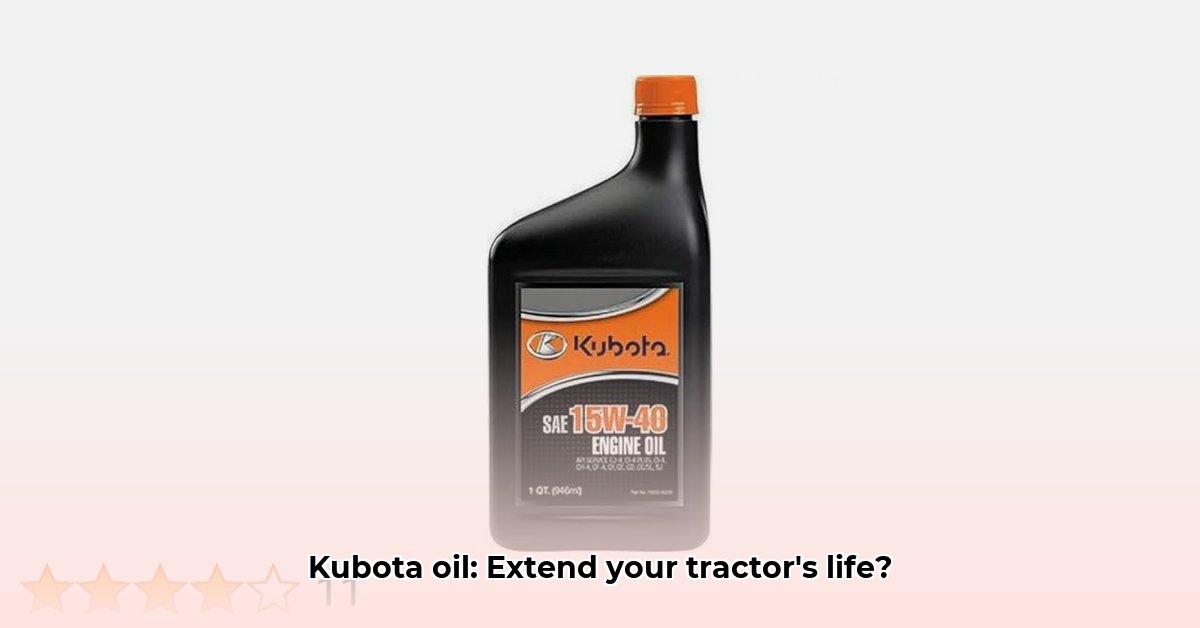
Understanding Your Kubota's Oil Needs: More Than Just Lubrication
Choosing the right oil for your Kubota tractor is critical for engine longevity and performance. The wrong oil can lead to costly repairs, while the right oil ensures smooth operation and extends the life of your investment. This guide will equip you with the knowledge to make informed decisions, optimizing your tractor's health and efficiency. For more in-depth information, check out this helpful guide: Kubota Oil Guide.
Factors Influencing Oil Selection
Before choosing an oil, consider these key factors:
Climate: Extreme temperatures significantly impact oil viscosity (thickness). In cold climates, a thinner oil (like 10W-30) ensures easy starting and prevents damage. Hotter climates necessitate a thicker oil (e.g., 15W-40) for superior high-temperature protection. What oil viscosity is best for your climate?
Usage Intensity: Heavy-duty use (e.g., plowing, hauling) demands more frequent oil changes and potentially a higher-quality oil, such as a synthetic blend or full synthetic. Lighter, seasonal use allows for longer intervals between changes. How frequently should you change your oil based on usage?
Kubota's Recommendations: Your owner's manual is the ultimate resource. It specifies the appropriate American Petroleum Institute (API) ratings (e.g., CF or higher) and Society of Automotive Engineers (SAE) viscosity grades for your specific Kubota model. Never disregard these recommendations.
Conventional vs. Synthetic Oil: A Performance Comparison
The choice between conventional and synthetic oil hinges on budget and performance expectations. Here's a comparison:
| Feature | Conventional Oil | Synthetic Oil |
|---|---|---|
| Cost | Lower initial cost | Higher initial cost |
| Longevity | Shorter oil change intervals | Longer oil change intervals |
| Performance | Adequate for moderate conditions | Superior performance, especially in extreme conditions |
| Environmental Impact | Generally less environmentally friendly | Typically more environmentally friendly |
| Engine Cleanliness | Can leave more deposits | Keeps engines cleaner, reducing wear and tear |
Long-Term Cost Considerations: While synthetic oil demands a higher upfront investment, its extended lifespan often translates to long-term cost savings due to fewer oil changes and reduced risk of costly engine repairs. It's a comparable investment to premium-quality tools—higher initial cost, superior longevity and performance.
Choosing the Right Oil: A Step-by-Step Guide
Selecting the correct oil involves a straightforward process:
1. Consult Your Owner's Manual: This document provides the exact API and SAE specifications for your Kubota model—it's the foundation of your decision-making process.
2. Assess Climate and Usage: Based on the factors discussed earlier, determine the optimal viscosity for your operational conditions. When in doubt, choose an oil suitable for the most extreme temperatures you expect.
3. Select the Oil Type: Weigh the advantages and disadvantages of conventional, synthetic blend, and full synthetic oils, considering your budget and usage patterns. A blend might offer a good balance of cost and performance.
4. Purchase the Correct Quantity: Ensure you buy sufficient oil to completely fill your engine, with extra for the oil filter change.
5. Perform the Oil Change (or seek professional help): Your owner's manual details the oil change procedure. If you lack mechanical expertise, it’s advisable to have a qualified mechanic perform this task.
Frequently Asked Questions (FAQ)
Oil Change Frequency: Refer to your owner's manual for the recommended interval (generally every 200 hours or annually, whichever comes first). More frequent changes are preferable to infrequent ones.
Consequences of Using Incorrect Oil: Incorrect oil can severely damage your Kubota's engine, potentially affecting performance, increasing wear, causing sludge buildup, and leading to substantial repair costs.
Mixing Conventional and Synthetic Oils: While possible, mixing different oil types is generally discouraged as it can compromise their properties and lead to unpredictable results. Stick to a single type for optimal performance.
Understanding API Ratings: API ratings (e.g., CF, CJ-4) indicate the oil's quality and performance. Higher ratings generally signify improved protection and cleaner operation. Always adhere to your manual's specifications.
Regular oil changes are pivotal for maximizing the lifespan of your Kubota. By selecting the right oil and following the maintenance schedule diligently, you ensure your tractor's longevity and operational efficiency. Your investment will thank you for it.